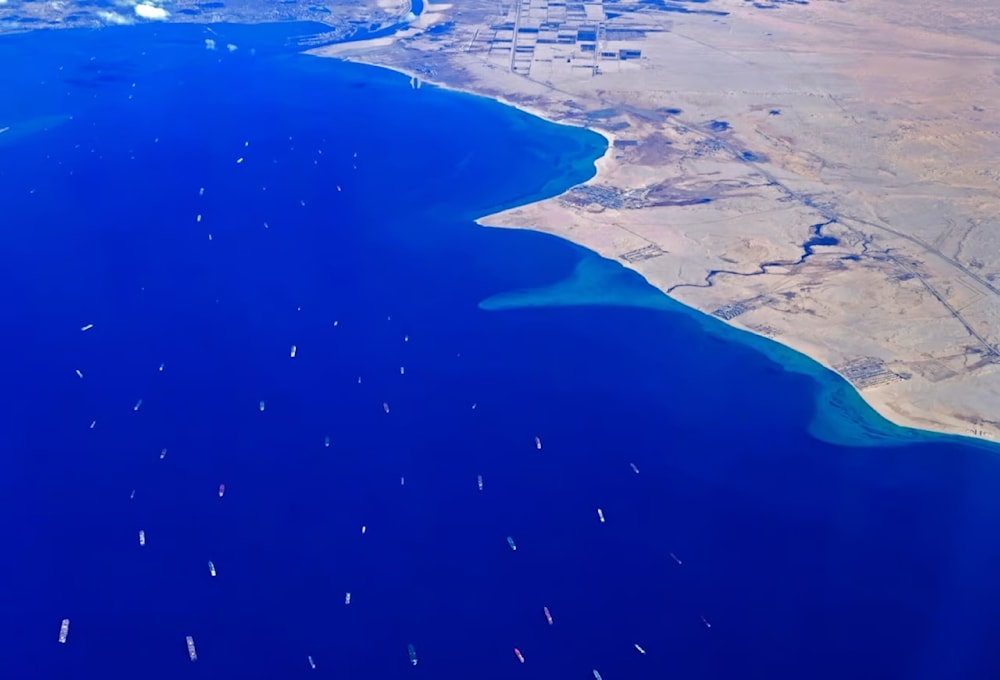US support of Israeli war on Gaza risks EU energy security, economies
Key regional players attribute the situation in the Red Sea to the US-backed Israeli war on Gaza, hinting that ending the aggression will restore calm in the strategic waterway.
-

An aerial view of ships in the Red Sea in 2021 (AP)
British energy giant Shell suspended all shipments through the Red Sea fearing the security situation following the US and UK aggression on Yemen last week, The Wall Street Journal reported. citing US officials.
This comes as major European countries - already struggling with energy supplies since the war in Ukraine started in February - are warning of an energy crisis looming unless the escalations in the Red Sea are resolved.
The EU's trade chief Valdis Dombrovskis said on Tuesday that "there are disruptions to the shipping routes concerning the Red Sea and, correspondingly, the use of the Suez Canal,” and while the effect on oil and gas is currently "contained, but certainly this is a risk for the European economy which we need to follow very closely."
Similarly, the EU's economy commissioner Paolo Gentiloni warned on Monday that the tensions could eventually result in energy prices in Europe skyrocketing.
"What is happening in the Red Sea (...) is not for the moment apparently creating consequences on energy prices and inflation," Gentiloni explained. "But we think that it should be monitored very closely because these consequences could materialize in the coming weeks."
Europe risking higher inflation
Washington has declared unwavering backing of "Israel" since day one of the war on Gaza, which crossed its 100th-day mark this week. Including open political support, the US continues to provide massive financial and weapons assistance to the occupation entity.
Last November, the Yemeni Armed Forces announced a ban on Israeli-owned or affiliated ships, as well as ships heading toward the occupation entity, from crossing through the Red and Arabian Sea.
Meanwhile, Sanaa stressed that all other ships are safe and free to navigate in the passageways and that operations will cease once the war on Gaza stops and sufficient food and medicine are delivered to the Strip's people.
However, these operations were strongly objected to by the United States and some of its allies, leading to Washington establishing a now-failed maritime sea coalition under the Operation Prosperity Guardian. This move did not attract EU countries, which chose to operate independently and not under Washington's command.
Read more: NATO, EU lack unity, Red Sea coalition is proof: Ex-Italian Navy chief
Last week, the US and UK launched a series of aggressions against Yemen, stating that they are in response to Yemen's operations. In response, Sanaa vowed an inevitable retaliation and that the attacks "will not go unpunished."
Western officials and analysts warned that this escalation might drag the whole region into a full-scale war, disrupting with it all shipping across the Red Sea, which is the route for about 12 percent of global maritime oil trade and 8% of gas.
"Europe and its people can expect to face higher energy costs, delayed shipments, and a return of inflation resulting in higher and longer-lasting interest rates," economist Osama Rizvi said in an op-ed for Euronews.
Overall, 15% of global shipping traffic passes through the Red Sea.
The world's top five shipping companies, along with over 10 other firms, announced rerouting their vessels away from the Red Sea and around Africa.
According to freight data analyst Vortexa, this could lead to a 58% to 129% increase in the duration it takes oil tankers to travel through the world's main routes, including India to Europe and the Middle East to Europe.
Read more: Red Sea shipping attacks may affect UK economy: Finance Minister
This has also prompted shippers to dramatically increase fees and insurance premiums for vessels crossing through the Red Sea.
In a recent report, Allianz Trade forecasted that the disruptions could result in a 0.7% increase in inflation for Europe, which could further delay a rebound from the severe economic crisis it's facing.
This could also force the European Central Bank ECB to keep the interest rates higher for longer, hindering efforts to slow down inflation at previously planned periods.
End war on Gaza to resolve the Red Sea situation
Commenting on the attack on Yemen, countries such as Turkey, Saudi Arabia, Iran, and Oman linked the Yemeni operations to the Israeli war on Gaza, indicating that the end of the war will result in an end to the escalations.
In that context, France announced it does not support the attacks on Yemen nor would it participate in them, citing fear of further escalations.
Diversifying energy sources became the EU's main concern since sanctions on Russia resulted in cutting off most gas supplies to the continent.
One of the alternative sources for the natural commodity was Qatar, one of the world's largest LNG exporters, which was able to provide the bloc with LNG to fill some supply-demand gaps.
But following the US and UK strikes on Yemen, one of the world's largest LNG exporters, QatarEnergy paused shipments via the Red Sea, before recommencing them two days later.
Qatar's Prime Minister Mohammad bin Abdulrahman bin Jassim Al Thani warned that the gas shipments will be impacted due to the rising tensions, warning that the attacks on Yemen will aggravate the crisis.
"LNG is... as any other merchant shipments. They will be affected by that," he said from the World Economic Forum in Davos.
Yet, as for now, ship trackers show that Qatari tankers are still safely sailing toward the Suez Canal.
Oil prices also saw an influx following the US and UK's attacks on Yemen, instigating worries about the escalation of the conflict in the oil-rich region.
The attack, backed by Australia, Canada, the Netherlands, and Bahrain, led to a surge in oil prices, which hit $80 this week.

 6 Min Read
6 Min Read








